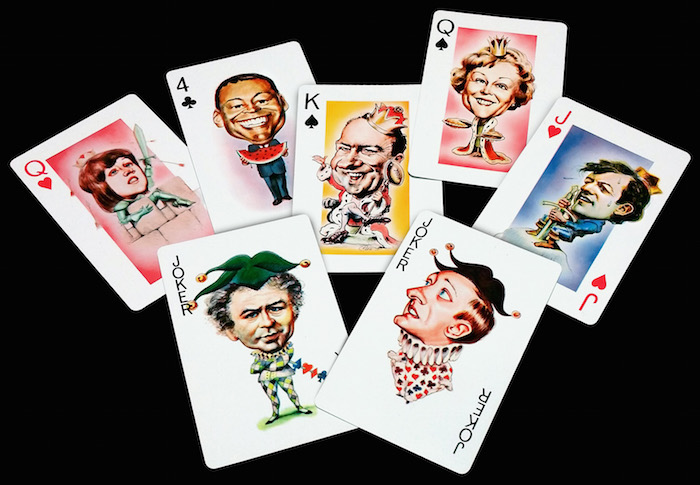When I finally found the narrative hook for my book on the 1960s the first thing I did was to set up Google alerts for my main characters. That in itself speaks volumes about how one does research these days. I thought nothing of stalking dead people on the Internet. But it paid off. It’s how I came across one of my favorite artifacts of the era.
In 1971, a toy and novelty company called Politicards produced a deck of playing cards that marvelously lampooned the era’s chief political figures. Satirist Peter Green had been asked to create a chess set featuring the era’s leading politicians. Instead, Green, a graphic artist, thought a deck of cartoonish cards would be funnier, and in the process founded Politicards.


Richard Nixon was king of spades, smiling broadly, donning a crown, football cleats, a red robe, and nothing else. Pat Nixon was his queen, as angular and harsh as her reputation, handing out pie in her domestic best. Vice President Spiro Agnew was the jack, using a golf club to beat the Democratic donkey upon which he sits. Green advertised with the slogan “Nixon for King.” The cards quickly sold out.
Eight of clubs was Barry Goldwater, waving a cowboy hat as he rides a nuclear missile to some unknown destination, a la Slim Pickens’ in Dr. Strangelove. Four of hearts Ralph Nader fixes a broken hubcap. Ronald Reagan, jack of clubs, looks to the future as he stomps a bearded hippie with both feet. Billy Graham demonically leads an aimless flock of sheep while Edward Kennedy, jack of hearts, tries valiantly to pull Excalibur from the stone, the presidency he never achieved.
Most of the women were queens, the best perhaps being Jane Fonda playing a gallant knight scaling the castle walls. But she only barely beats out boozy Martha Mitchell, who pours herself a drink while still in bed.
The only black character was Edward Brooke, the Republican Senator from Massachusetts, who in 1966 became the first African American popularly elected to the United States Senate.
For me, the real find was the two central characters of my book, William F. Buckley, Jr. and Norman Mailer. Conveniently for my book’s argument, Buckley and Mailer are the deck’s only jokers. As icons of the 1960s, when they did so much to give voice to the radical extremes of the left and right, by the early 1970s, both men had become symbols of a previous era, the times having passed them by. Buckley looks wistfully to the right, the perfect courtier. Mailer engages his subject directly, his blue eyes both a challenge and an invitation. But they were jokers nonetheless. “Jokers” actually became the title of the penultimate chapter of my book and their Politicards images adorn the book’s jacket.
The company took a hiatus after 1972 but resurrected the satirical playing cards in 1996. It has produced a deck every presidential election year since. And it’s still true, that, as my 1971 box ($35 on eBay) says, “Every card a character.” One wonders what Hillary, Rand, Marco, and Chris will look like in this year’s deck. And, of course, who will be this year’s jokers?
My money is on Jon Stewart and Bill O’Reilly.
++
Kevin Schultz's book, Buckley and Mailer: The Difficult Friendship that Shaped the Sixties is out today from W. W. Norton.
